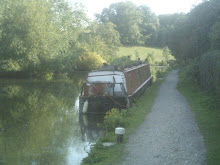It seems we have confirmation of my previous suggestion from a reliable source - British Waterways.
Their web page 'Charitable Trust Plans' today states that, "In April 2012 the Canal and River Trust will take over as the guardian of the waterways in England and Wales bring to an end over 60 years of public ownership."
RIP the Select Committee who said: We were extremely surprised to discover that privatisation was one of the options being considered by BW’s ongoing strategic options review, and are disappointed we were not informed about this during our evidence sessions with BW. In our view, privatisation is not a serious option: the waterways network is a public asset providing wide benefits to society and some Government funding will always be necessary. It should be ruled out by the Government.
Source: http://www.publications.parliament.uk/pa/cm200607/cmselect/cmenvfru/345/345.pdf
The detailed committee report from, (para 66 ff) , also describes in gory detail how BW failed to mention to the committee that they were in fact looking at the privatisation route as far back as 2006. Perhaps BW's reticence to disclose this to the committee was because further enquiries revealed an instruction from their then Minister that privatisation was the one option that should not be considered? BW it seems apparently directly ignored this instruction.
For me this again re-confirms the complete arrogance and contempt for accountability within the the current management team at BW and why they cannot be trusted.
I genuinely pity the CRT Transition Trustees their responibilities - if as the record shows BW senior management are prepared to conceal their true intentions from their supervising Minister and a Select Committee, how much should you rely on what they are telling you?
EFRA Select Committee Pages
Subscribe to:
Post Comments (Atom)


Simon, although I don't agree with all of your views, I generally find your posts interesting and informative if only because they represent another point of view.
ReplyDeleteHowever, I must say that the idea that the Canal & River Trust represents a form of privatisation is, frankly, ludicrous.
You are, of course, correct that privatisation was considered as one of the possible alternatives to BW as a public corporation just as Government considered several times selling off BW's property portfolio. Any responsible organisation (and that includes a Government) considering ways forward would not be exercising due diligence unless it at least considered privatisation. Clearly, that option was considered and rejected as we are moving rapidly towards the formation of a new charity.
What you don't explain is what it is in the new charitable structure and planned governance that you feel warrants it being described as a form of privatisation.
First, privatisation would mean CRT would be owned by private investors. As such it would an organisation dedicated to creating a profit for those shareholders. The reality is that CRT will belong to us, the users, held in Trust for future generations. Any surplus generated - whether direct (for example from license fees) or indirect (for example net income from the property portfolio) - will go exclusively towards the operating and maintenance costs of the waterways and not distributed as dividends to investors as would be the case in a privatised organisation.
Another huge difference between CRT and a privatised company will be the method of governance. The highly paid Board of Directors that exists with both public and private corporations will be replaced by a volunteer Board of Trustees. The appointment of Trustees will be subject to the approval of an Members Council representing us the users, and largely elected by us, the users.
In addition to the top down effect of the Members Council, each waterway region will have local waterway partnerships which will, again, be populated by users. These partnerships will work with regional waterway managers in a cooperative fashion that I believe will effectively place the future of our waterways in the hands of any waterway-based community that wishes to influence their local environment.
Remember too, that the Chairs of these regional waterway partnerships will each have a place on the Members Council thereby ensuring there is a line of communication flowing between top and bottom.
So where in all of this is any element of privatisation?
Regards
Will Chapman
Hi Will,
ReplyDeleteIf it's coming out of public ownership, (i.e. as Richard Benyon said, leaving the public sector), if it's no longer ultimately accountable to Government, what is that but privatisation?
Yes - Privatisation does not automatically mean profit making for shareholders, and not so in this case. A similar example I know well professionally is the transfer of Council Housing to a Housing Association. Many Housing Associations are limited companies and generally treated legally as private bodies, but are also charitable, what many dub as 'Third Sector'.
I wish I shared your optimism about the new structures. The Council ultimately only looks like it will be advisory. Time will tell how much clout it really has?